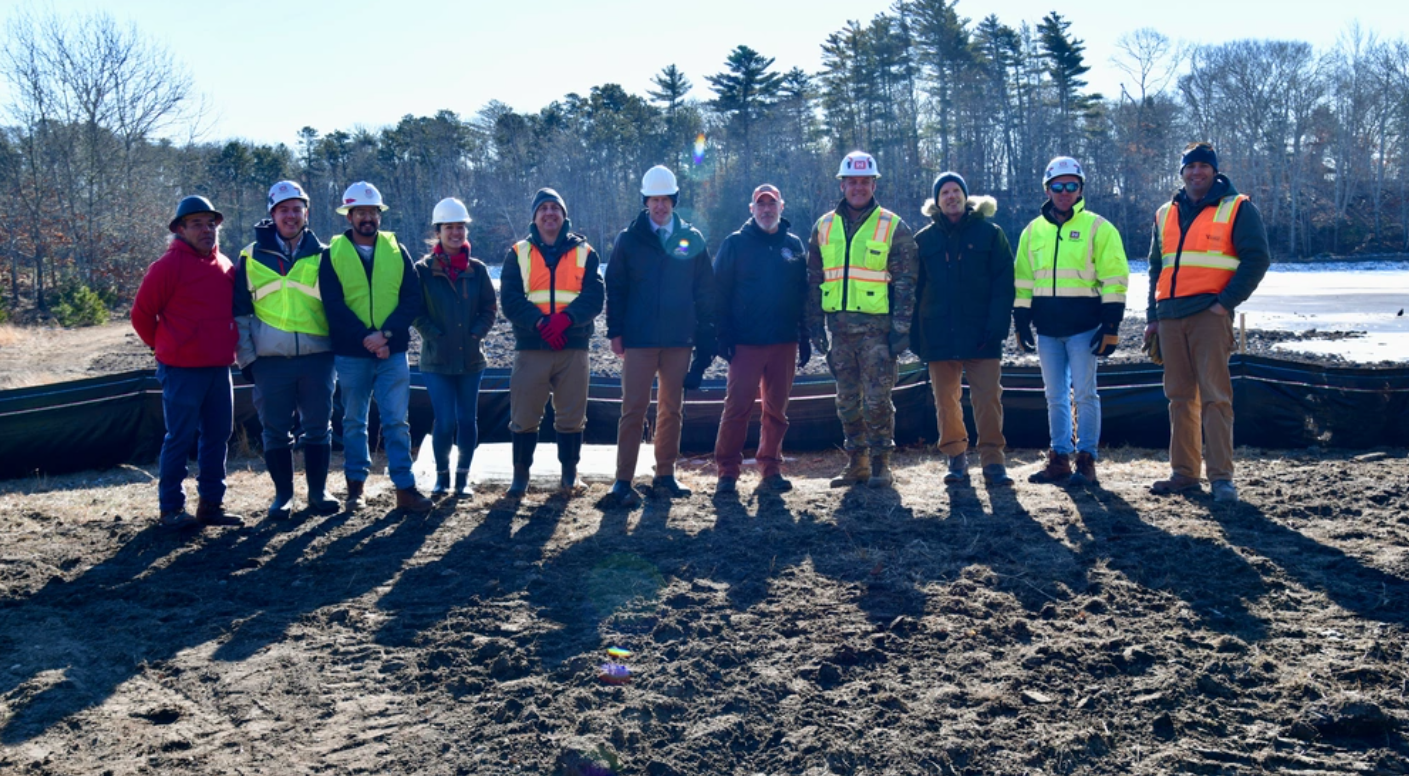- Department of Fish and Game
Media Contact
Julia E. Hopkins, Communications Director

MASHPEE — Construction is well underway to transform Chop Chaque Bogs from retired cranberry farmland into healthy, restored wetlands through an innovative partnership between the U.S. Army Corp of Engineers (USACE), the Massachusetts Department of Fish & Game (DFG), the Town of Mashpee, and Native Land Conservancy. Funded by $425,000 from the DFG In-Lieu Fee Program (ILFP), the project will benefit biodiversity, water quality, climate resilience, and migratory fish habitat in Santuit Pond in Mashpee.
“This initiative, alongside efforts from state, local, and Indigenous organizations, is a relatively small investment to ensure the return of a healthy and biodiverse habitat, leading to a healthier environment and a better place to live here in New England,” said USACE New England District Colonel Justin R. Pabis.
"This is a shining example of the power of collaboration between federal, state, local, non-profit, and Tribal partners to advance a nature-positive future for Massachusetts. We are proud to administer the In-Lieu Fee Program to support projects like this statewide,” said DFG Commissioner Tom O’Shea. “With a few interventions to kick-start the process, projects like this demonstrate nature’s remarkable ability to heal from human impacts. We are thrilled to see the wetland ecosystem flourish from the diverse bank of dormant seeds that have been buried for over 100 years.”
“The In-Lieu Fee Program is an invaluable resource for successful restoration projects. The Town of Mashpee’s Conservation Department greatly appreciates the opportunity this funding has provided to restore the Chop Chaque cranberry bogs back to native wetlands,” said Andrew McManus, Conservation Agent for the Town of Mashpee.
For over a century, Chop Chaque Bogs was used by local farmers for cranberry agriculture. In 2019, the Town of Mashpee purchased the 11.7 acres adjacent to Santuit Pond, the headwaters of the Santuit River. In 2020, the Town established a conservation easement with the Native Land Conservancy to promote Indigenous cultural access to the land and waters.
The project will restore 6.5 acres of the former cranberry bogs into healthy, self-sustaining wetlands. By removing historic ditches and sand, roughening bog surfaces, and bringing back diverse native plant communities, the project will have many benefits for nature and people. Ecologically significant for species listed by the Massachusetts Endangered Species Act (MESA), wetland restoration will also benefit water quality and migratory river herring in Santuit Pond, which is also culturally significant for Indigenous people including the Mashpee Wampanoag tribe. After nearly four years of design, planning, and permitting, construction began in December 2024 and will be complete in January 2025. The site will re-open to the public soon after construction, creating a new public access point to Santuit Pond.
The Massachusetts Department of Fish & Game (DFG) administers the U.S. Army Corps of Engineers In-Lieu Fee Program (ILFP) for the Commonwealth of Massachusetts. The ILFP allows Corps permittees, as compensation for negative impacts to federally-protected wetlands and waterways, to make a monetary payment to DFG’s ILFP fund in-lieu of required on-site mitigation. This allows funds to support larger-scale conservation or ecological restoration projects in four service areas: Berkshire/Taconic, Connecticut River, Quabbin/Worcester, and Coastal Massachusetts. Since the DFG ILFP was founded in 2014, over $9M in mitigation funds have been used to support 12 projects that protect or restore aquatic resources statewide with four others in progress. Projects include wetland restoration, watershed protection, eelgrass restoration, artificial reef habitat enhancement, cranberry bog restoration, and salt marsh conservation and restoration.
The Town of Mashpee’s Conservation Department is pleased to partner with the Native Land Conservancy to add Chop Chaque Bogs to the portfolio of more than a dozen properties the Town manages for conservation. The project team is also grateful to the Mashpee Department of Public Works for their assistance with the demolition of the former pump house. For information about conservation lands in Mashpee or to volunteer with the Mashpee Land Stewards or Herring Count Program, visit mashpeema.gov/conservation.
The Native Land Conservancy (NLC) is an Indigenous-led land conservation nonprofit accepting the honor to protect, share, and restore land and water for the four-legged, the two-legged, the winged, and the finned. Founded in 2012 as the first Native American-led land conservation group east of the Mississippi, NLC’s mission is to preserve and restore healthy landscapes for all living things wherever possible. NLC’s relationship with the earth is one that is familial and seeks to preserve land for future generations through land rescue, cultural preservation, and education.
###

